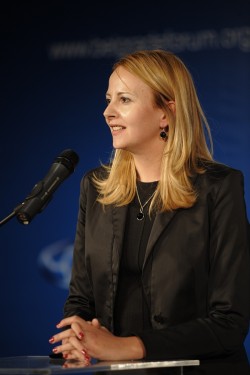Session 4: EU Enlargement: Picking Up the Pieces?
(in cooperation with the Delegation of the European Union to the Republic of Serbia)
Ten years after the 2004 enlargement the EU now has 28 Member States; 13 new member states joined over the last 10 years. It is possible to acknowledge the benefits of this policy both for the acceding countries and EU as a whole in political, economic and social terms. Enlargement remains a key policy for peace, stability and prosperity on the European continent. However, the issues of integration and the EU’s absorption capacity were raised soon after the “big bang” enlargement in 2004. These objections were seemingly resolved through renewed consensus in 2006 which addressed the concerns of many in the EU, and essentially made the process of accession more rigorous. ‘Strict but fair conditionality’ has become a mantra and a dominant trajectory for an ever-evolving enlargement policy. Addressing the fundamentals (i.e. democratic and economic fundamentals) has translated into a number of instruments, benchmarks, and conditions implemented/imposed by the European Commission in an effort to properly prepare acceding countries and convince the European public about future enlargement/memberships. Despite oft mentioned ‘enlargement fatigue’ and the other side of the coin ‘reform fatigue’, Croatia successfully completed negotiations and joined the EU in mid-2013, proving that the European perspective still exists, though no further enlargements are envisaged over the next 5-year ‘digestion’ period. Six Western Balkan countries are at different stages of EU accession, alongside Turkey’s long EU path and Iceland’s application which was suspended in 2013. Currently, 4 Western Balkan countries and Turkey have candidate status, two are potential candidates, and an open-doors policy remains in force for Iceland.
Discussion Topics:
- Is there a concern that the 5-year enlargement pause announced by the new President of the EC Mr. Juncker will discourage acceding countries?
- How will the economic governance and fundamentals be translated into enlargement conditionality in practical terms?
- Regional cooperation remains a key to the Stabilization and Association Process – what are the outlooks for achieving better and sustainable neighbourly relations in the Western Balkans?
- Should EU consolidation go hand in hand with enlargement policy consolidation and how?
- Understanding and endorsing European integration as an internal reform agenda, or, where is the internal capacity for reform?
- Lack of support for enlargement and EU integration in the EU and the Western Balkans and how should this be addressed?
- Managing the expectations of the Eastern neighbourhood and how can these be translated into stronger economic and political ties?
- Where are the borders of the EU and the limits of its enlargement policy?
Speakers:
Amb. Ivan Jestřáb‚ Director of the South and South-East Europe Department, Ministry of Foreign Affairs, Czech Republic
Vessela Tcherneva‚ Programmes Director, European Council on Foreign Relations
Theresia Töglhofer ‚ Program Officer, Alfred von Oppenheim Center for European Policy Studies, DGAP
Steven Blockmans‚ Senior Research Fellow and Head of Unit, Centre for European Policy Studies (CEPS)
Maja Bobić‚ Secretary General, European Movement in Serbia (Moderator)





